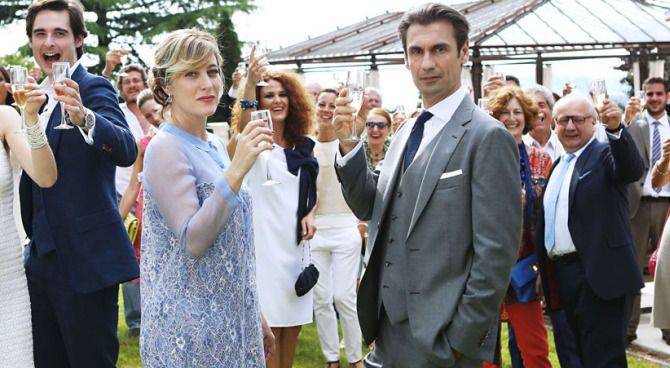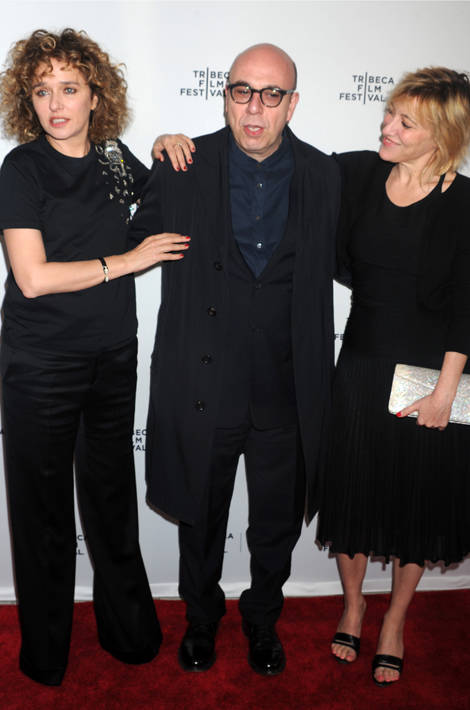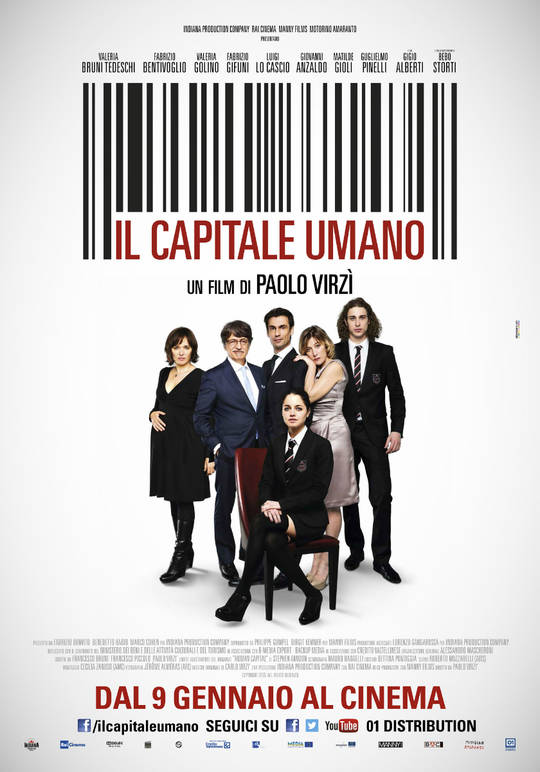Human Capital: Paolo Virzi's Film @ the Tribeca Film Festival
“This slick, stylish fusion of class critique and murder mystery confirms Paolo Virzi as one of Italy's more dynamic directors.” The words of journalist Jay Weissberg writing for Variety could not be more welcome by director Paolo Virzi, who was in New York to accompany his latest film, Human Capital, at the Tribeca Film Festival. A story at the intersection of family, class and passion that centers on a single pivotal incident, Human Capital is a thriller that deconstructs typical linear narrative and observes transformative events from different character's perspectives. It's a class critique, a look at the super rich and at the wannabes and at their greed.
The film stars Fabrizio Bentivoglio in the role of Dino, Valieria Golino in the role of his wife Roberta. Valeria Bruni Tedeschi in the role of Carla, and Fabrizio Gifuni in the role of her husband Giovanni. The first two are the Rovellis, struggling to keep their middle-class life, the others are the Bernaschis, millionaires who play tennis as much as they play with other people's money.
We had a chance to meet director Virzi after the first screening of his film.
Your film opened last night at the Tribeca Film Festival, how did it go?
The reaction was amazing, we are really flattered. What really surprised us is that the festival's audience was incredibly attentive and not only have they not missed the ironic element of the film, which is not right in your face but it is rather hidden, but they have experienced moments of real hilarity... much more than Italian audiences. The Italian public knows me well, mostly as the author of comedies, even though at times they are not “easy” comedies, as they always have a more serious message. This film is a drama, a noir, a thriller.. a slap in the face of the spectator who is forced to think about ethical issues. The American audience got all this, but they got something more. I think that above all, the personality of the Italians living is today's Italy makes them smile.
A couple of days ago we met with director Marco Bellocchio. He was saying how he would love to sit in the movie theater and listen to the audience's remarks...
I really love that. It is the definite fianl phase of a director's job. Films are made to be shared with everybody. When they are finished they are not mine anymore, but they belong to the audience. That final check is vital. In Italy I put a cap on and I go to the movies, at times even all by myself, and I sit there to hear people's reactions. Often I travel abroad to promote the latest film I've worked on and I cherish the feedback of spectators of a different culture, who see my stories with different eyes. In this particular case I was really surprised by laughter, people were really laughing in moments that were truly unexpected...
Do any of these moments come to mind?
Sure, the moment when Dino (Fabrizio Bentivoglio) goes to blackmail Carla (Valeria Bruni Tedeschi). He asks for money but also asks for a kiss. People was really hysterical. In Italy maybe somebody half smiled, because the moment is really dramatic. He is despicable but this didn't stop people from laughing and clapping their hands. This is not an isolated case, it happened in other moments of the film as well. I am very happy about this outcome, and the reviews from Variety, the Hollywood Reporter and other local press are excellent and they even use more emphatic expressions that the ones used by the Italian press. The Italians have welcomed the film really well too, but their tone is more calm. Tribeca is the first stop of a long promotional trip as the film has been sold to distributors in 35 countries – we will be in Asia, Latin America, all over Europe... this was our first face to face with an international audience, the first of many!
The film will see a US theatrical release in early 2015. It will be distributed by Film Movement. Adley Gartenstein, the company's co-president, has said: “We love the movie's portrait of a society struggling with the same issues of economic inequality that we're seeing here in the US.” What does it mean? Is this an Italian story or a universal story?
The film was inspired by an American novel, Human Capital by Stephen Amidon. We have adapted it taking lots of liberties but the heart of the novel is, of course, there. I really admire the author and I am a fan of his work, I think he is a young writer who has those special qualities that many great American “social” writers possess... through the thriller genre they actually portray, accurately, contemporary society. The story is about the consequences on people's lives caused by a value system where money reigns supreme, during the years of the financial crisis. People live in fear, in distress, scared that everything might collapse at any moment. This state of living is told as a thriller and in our own way. We have chosen a non-linear narrative process. The film starts from the end and the story is told by different characters, three to be exact, who have different points of view. The final chapter concludes the story. Form the very beginning the audience understands that this is not a comedy but something rather dark.
Tell us more about starting the film from the end of the story.
It was a way to let the audience know what kind of story they are about to be told. On a cold winter's night a poor soul is hit by a car and is left behind, on the asphalt, with no help. After this rather tough beginning, the movie starts like a comedy... a charlatan arrives at the villa of a millionaire and offers to play tennis with him and his friends. It seems fun, even somewhat ridiculous, but there is some underlying anxiety in all this. Then the police arrives...
How did you discover the book?
I am a fan of all contemporary American literature. I like the way these authors describe our times, the reality of their country with non-moralistic tones but with efficient plot lines. Amidon is one of them.
The novel is set in Connecticut while the film is set in an imaginary location in northern Italy. Where's the connection?
While I was reading the book I told myself “this is us.” A real estate agent living in Brianza is no different from one living in Connecticut. The town in the novel is described meticulously, it is very real, but Amidon confessed to me that it's all made up. Orchard Road, does not exist! He was looking to tell his story in a sort of metaphorical realism as well.
What can you tell us about working on a film based on a book and knowing its author personally?
I often write films based on books, I believe that through cinema we can make them live longer, further, have another life. I've never translated a book into a film scene by scene, I've always taken lots of liberties. Amidon is a great friend, and he is in Italy right now... he loves it. He did not collaborate to the writing of the screenplay, but he has been very supportive and generous with his material.
The film was released in 2014 but it is set in 2010...
Yes, there is a reason why we made that choice. 2010 was a crucial year in Italy. The year of the great financial crisis that hit out government funds. We risked a total financial collapse. It's the year when Berlusconi resigned and the year when the BCE started controlling Italy. The story would be different if it were set in 2014. The situation is different... Berlusconi is doing community work, the politicians are all new. The financial situation seems to be improving. Who knows what Dino would be like in 2014...
Is there any character you feel for in this story?
There are no victims and no heroes. I feel for the kids though, because even though they make their own mistakes, they are victims of the actions of their parents who use them as they wish, always having money on their mind.




































i-Italy
Facebook
Google+
This work may not be reproduced, in whole or in part, without prior written permission.
Questo lavoro non può essere riprodotto, in tutto o in parte, senza permesso scritto.